Dachshund puppies spend the majority of their day sleeping, chewing and playing.
A crucial part of their development is learning how to play nicely with other dogs and humans. As your puppy grows, they will use their mouths to discover all of life’s exciting nuances.
But have you ever had sharp puppy teeth dig into your skin? It hurts! Although a mouthy puppy can be cute, it’s not always enjoyable.
While Dachshunds like to nip and bite when they are in their adorable puppy stages, they need boundaries so they grow up to understand that they cannot be sinking their teeth into everything.
If a puppy is not discouraged from biting, they may grow into an adult who loves to bite and nip.
Here, we’ll talk about how to get your Dachshund puppy to stop nipping and biting, and why they might be doing it.
Why is My Dachshund Puppy Nipping and Biting?
It’s fairly common for Dachshund puppies, or any puppy for that matter, to constantly nip and bite. But just because it’s common, doesn’t mean it’s appropriate behavior though.
Puppies tend to use their mouths to investigate new objects and people. They unknowingly dig their razor sharp teeth into whatever it is they are interested in.
Dachshund puppies don’t understand that they may be harming a person or object by using their mouth.
Learning bite inhibition is important for any dog and a natural step in any puppy’s training.
Ultimately it’s best to teach your Dachshund to be gentle, or to completely stop mouthy behavior.
Puppies don’t bite people to intentionally hurt them. It’s their way of exploring and may be related to teeth growing in.
Puppy nipping and biting are common during playtime, but your Dachshund may also be doing it because they are teething or want attention.
If your puppy is teething, they may be attempting to find relief by biting into anything within their grasp.
Note: Some the links in this article are affiliate links (Amazon Associate or other programs we participate in). As an affiliate, I earn from qualifying purchases.
How to Teach Your Puppy Not to Nip or Bite
Now that we know why your Dachshund is nipping and biting, it’s time to work on curbing the behavior.
You’ll need to teach your pup that they should not be sinking their teeth into human skin and that there are other, more appropriate things to bite.
Tactic #1
If you’re on the floor playing with your Doxie and they start to become mouthy, simply take your hand away or stand up and walk away.
Remove access to your hand if your puppy is biting it.
Remember to not jerk your hand away quickly or your puppy might think it’s a game and try even harder to bite on your hand. Instead, merely allow your hand to go limp and slowly move it away.
Don’t ever physically punish your Dachshund. Instead, simply remove their reward – you – from the situation.
For some puppies, saying “ouch” really loud before you walk or turn away can help get the message across.
Tactic #2
When you tell a dog they are not supposed to do something, the most important step in training is letting them know what they are supposed to do instead.
When your Dachshund puppy starts nipping or biting during play, redirect their mouthiness to an appropriate chew or toy.
Offer a Puppy Kong filled with peanut butter or a safe bone for them to gnaw on.
If you are petting your puppy and they begin to nip at your hands, redirect their focus to the toy.
Try substituting a tug rope or toy when your puppy wants to play with your hand.
This will teach your puppy what they can and cannot chew on.
Switch up toys from time to time so your Dachshund puppy remains interested in interacting with them, rather than your hands. The same toys can get boring and tiresome to your playful pooch.
Tactic #3
Although it’s tempting to entice your puppy into watching and playing with your hands, avoid doing this.
Instead, use a toy or tug rope when playing with them.
Be sure to keep a couple toys within reach during playtime. You may also want to carry one in your pocket if you Dachshund likes to nip and bite at your ankles while you walk.
Tactic #4
If your Dachshund puppy starts to nip or bite at your hands or ankles, say no calmly and firmly.
If they continue to do it, put your Dachshund in their crate or playpen for a few minutes to help get the message across that fun time is over if they start using their mouth.
Putting your puppy in time out is not punishment. It’s simply another way of saying “that’s enough” and helps to teach them boundaries.
Dachshund parents understand when their puppy is teething or play biting, but guests in your home may not appreciate it.
A mouthy puppy can be persistent in their pursuit for play, and it’s perfectly fine to keep them in a playpen or crate when you have house visitors.
If your guests are interested in assisting with your training, lay out expectations and allow them to partake in the learning process.
Your puppy is sure to enjoy the attention!
Important Notes About a Dachshund Puppy’s Biting and Nipping
Give your Dachshund plenty of opportunities to socialize with other dogs. You may want to enroll your new Doxie in a puppy or training class where they can learn proper socialization and play skills.
Socializing a puppy at a young age is crucial for proper development but other dogs will also teach your puppy how much and how hard it’s appropriate to bite.
Also, your Dachshund will be less motivated to play roughly with you if they are tired of expending energy with other dogs.
Socializing is a great way to train your dog how to behave properly.
When your puppy is introduced to children, remember that your Dachshund won’t understand that the tiny human is fragile.
Biting and nipping can be especially harmful to a child’s small stature and precious skin.
If you’re the parent of human kids, it’s important to teach them how to respect animals and their boundaries at a young age.
On the flip side, unfamiliar kids don’t always know how to act around small dogs, as they can be seen as toys.
Because of this, it’s important that you pay close attention to your puppy when interacting with children. You don’t want any puppies or kids to get hurt due to playful, mouthy behavior.
If your Dachshund is no longer a puppy but they are still nipping and biting, it’s not too late to teach them how to act appropriately using repetition and consistency.
The same technique above can be used when training adult Dachshunds. Just keep in mind that it may take a bit longer for them to stop nipping and biting because they are more set in their ways.
Even older Dachshunds can be trained to stop biting and nipping.
Seek out the help of a certified canine behaviorist who can get you on the right track using positive reinforcement. You can also ask your veterinarian for recommendations.
Final Thoughts
Remember that a puppy’s mouthiness is normal, but it needs to be directed to appropriate situations such as chewing on toys.
Never slap or hit your Dachshund. This can cause fear, aggression and a further desire to bite. Physical punishment will only teach your dog not to trust you.
Play encourages a bond between you and your Dachshund puppy, so don’t avoid the activity. Using one or all of the techniques outlined above will encourage healthy, safe play time.
Never use your hand to entice your puppy to play. This exacerbates your Dachshund’s desire to nip and bite at the hand.
Avoid encouraging your puppy to nip by waving your hands or fingers.
It’s best to be patient without getting frustrated, and it’s up to you to determine when their mouthy behavior is too much.
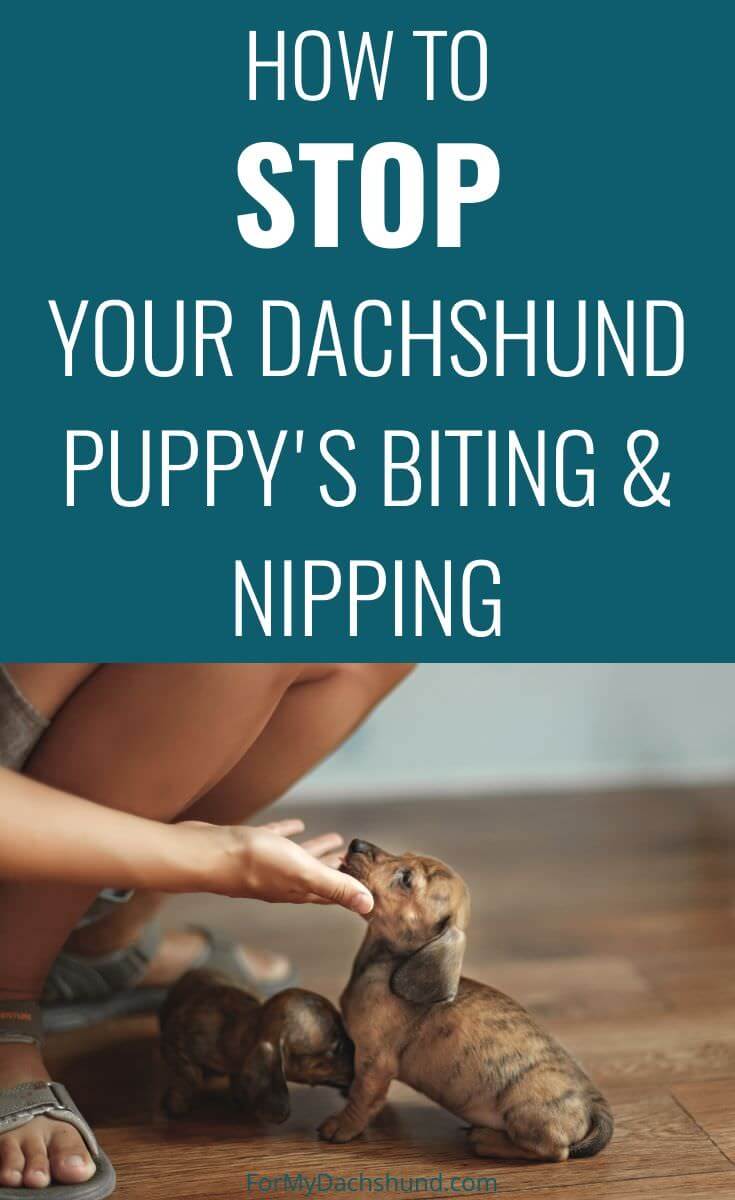
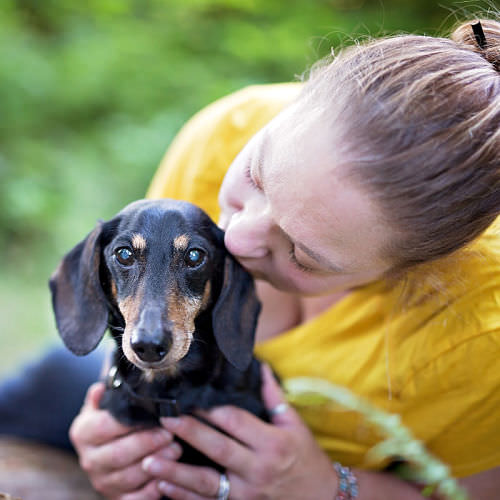
About the Author: Through her 17 years of owning and caring for Dachshunds, and almost 10 years researching and writing about them, JW has become a respected expert in the Dachshund community. Read more about her here.

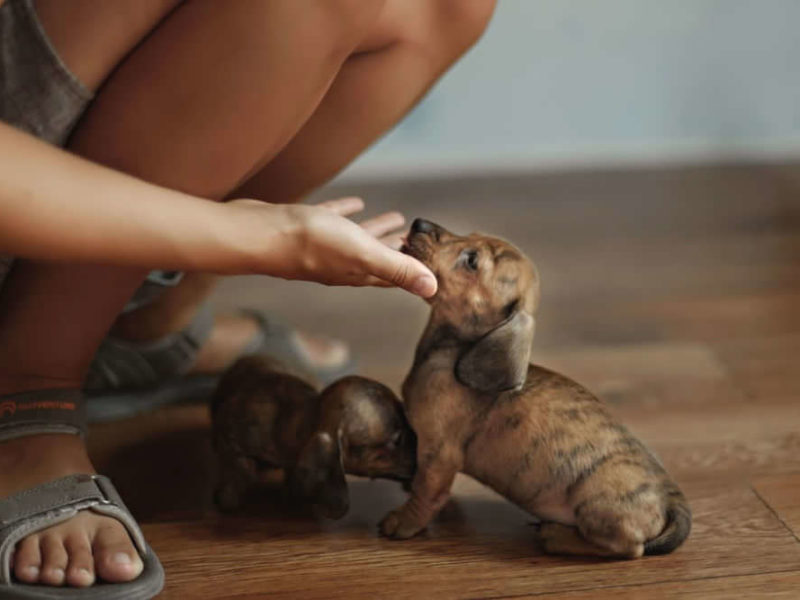
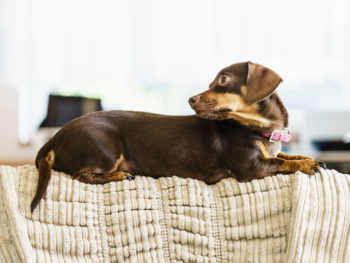
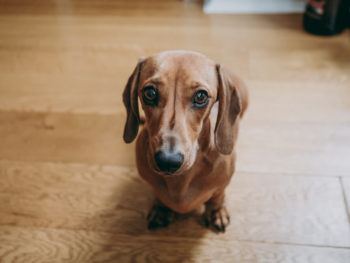
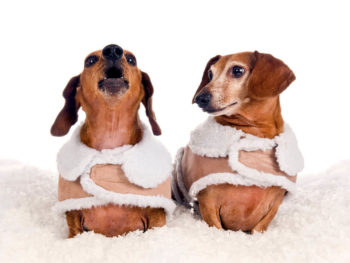
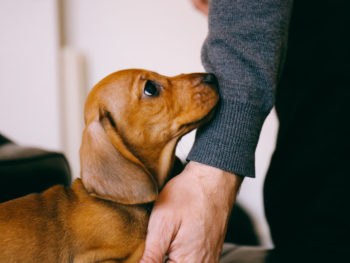
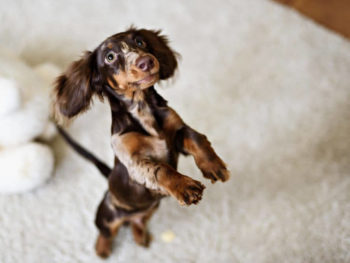
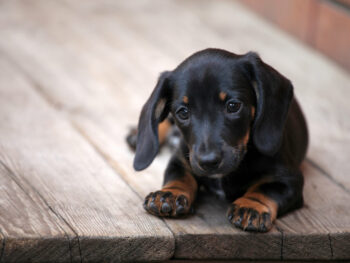
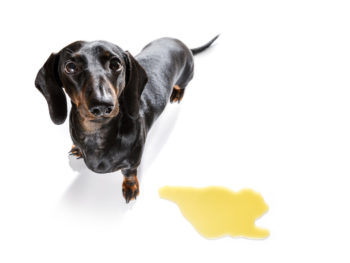
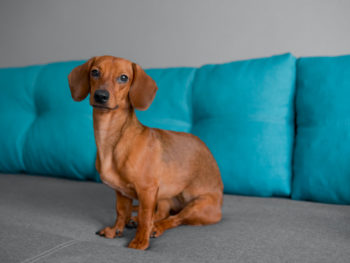
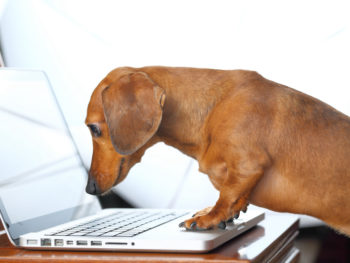
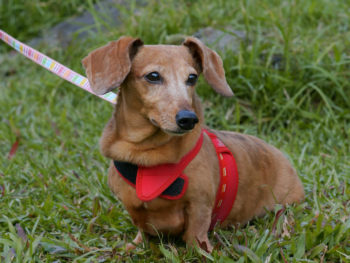
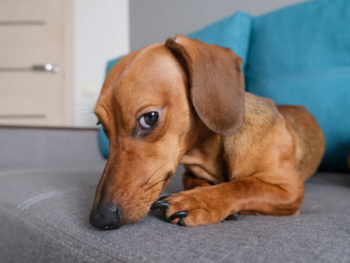
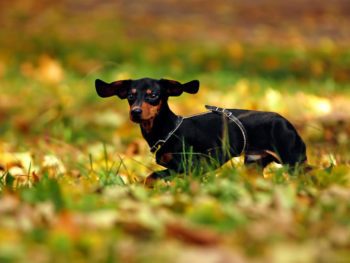
 5 Crucial Training Commands That Every Dachshund Must Know
5 Crucial Training Commands That Every Dachshund Must Know


